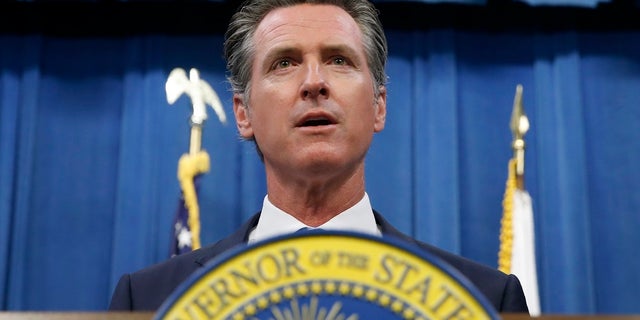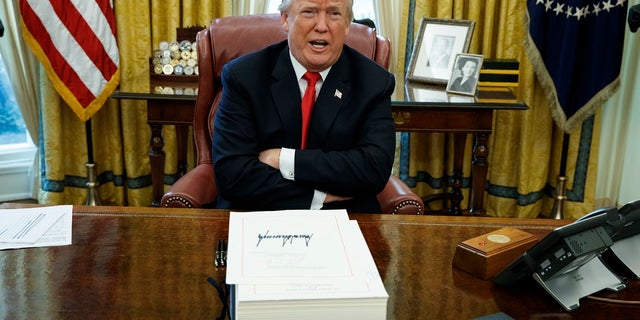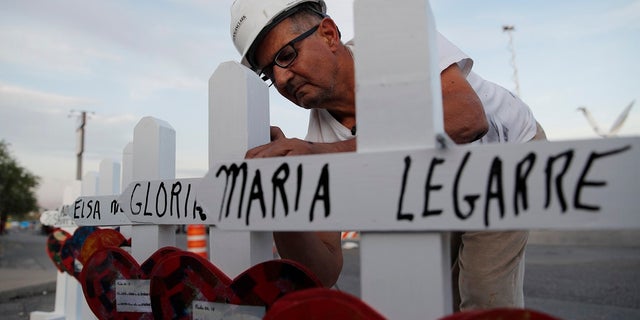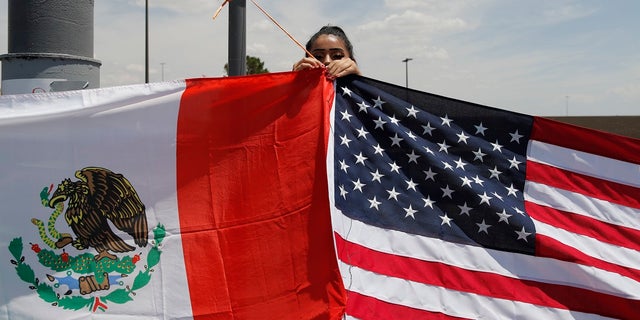El
Paso, Texas, Mayor Dee Margo told reporters on Monday that President
Trump will visit the city on Wednesday, even as several prominent
Democrats
indirectly blamed the president for Saturday's mass shooting there -- with some warning him, in frank terms, to stay away.
News
of Trump's planned appearance teed up a potentially bitter national
political moment just four days after suspected gunman Patrick Crusius,
21, allegedly opened fire at a Walmart and killed 22 people while
injuring more than two dozen others.
"He is president of the
United States," Margo, a Republican, told reporters. "So in that
capacity, I will fulfill my obligations as mayor of El Paso, and hope
that if we are expressing specifics that we can get him to come through
for us."
The
mayor said he anticipated "political spin" and was “already getting the
emails and the phone calls” from individuals "with lots of time on
their hands," but that his focus remains on his community, not politics.
He added that Trump had called and was "very gracious" and offered any
support necessary.
“We’re dealing with a tragedy of 22 people who
have perished by the hateful, evil act of a white supremacist,” Margo
said. “I don’t know how we deal with evil. I don’t have a textbook for
dealing with it other than the Bible.
"I’m sorry. We are going to
go through this," he continued. "The president is coming out. I will
meet with the president. I guess for people who have lots of time on
their hands, I will deal with the emails and phone calls.”
The White House has not confirmed Trump's schedule, or whether he will also visit Dayton, Ohio -- where a gunman who reportedly
supported the violent left-wing group Antifa, as well as Bernie Sanders
and Elizabeth Warren, killed nine people over the weekend. But the
Federal Aviation Administration has advised pilots of a presidential
visit Wednesday to both El Paso and Dayton.
Dayton Mayor Nan
Whaley, a Democrat, told reporters that she had "not gotten a call"
about a presidential visit as of late Monday, and didn't have more
details.
But
both before and after Margo's announcement, several
Democrats forcefully urged Trump not to visit El Paso. Rep. Veronica
Escobar, D-Texas, who represents the district that is home to the
Walmart where Saturday’s shooting took place, lashed out at the
president on Monday morning -- placing some of the blame for the
weekend’s tragedy at his feet.
“The president has made my community and my people the enemy,” she told MSNBC’s “Morning Joe.”
Greg Zanis prepares crosses to place at a makeshift memorial for
victims of a mass shooting at a shopping complex Monday in El Paso,
Texas. (AP Photo/John Locher)
“He has told the country that we are people to be
feared, people to be hated," Escobar continued. "From my perspective, he
is not welcome here. He should not come here while we are in mourning.”
And
Democratic presidential candidate Tim Ryan, D-Ohio, urged Margo in a
televised interview to "quietly" tell Trump that he is not "welcome" in
the city, because of his rhetoric on immigration.
Ryan has
escalated his language in the last 24 hours, as he struggles to raise
his political profile. He tweeted “Fck me” after Trump mistakenly, at
one point in his televised remarks earlier in the day, said the Ohio
shooting took place in Toledo and not Dayton.
For Ryan, the
language appeared to be part of a deliberate approach: Earlier Monday,
the longshot candidate went on CNN and tore into Senate Majority Leader
Mitch McConnell, saying, "Mitch McConnell needs to get off his a-- and
do something.” On Sunday, he tweeted: “Republicans need to get their s--- together and stop pandering to the NRA. Period.”
Sanders also
called out the president, saying "I say to President Trump, please stop
the racist anti-immigrant rhetoric. Stop the hatred in this country
which is creating the kind of violence that we see."
In 2017, a far-left Sanders supporter fired upon a Republican congressional baseball practice, critically
wounding House Majority Whip Steve Scalise, R-La., and injuring three
others before U.S. Capitol Police took him down. Kentucky Sen. Rand Paul
said the gunman was screaming, "This is for healthcare." Sanders did
not take responsibility for that episode.
Trump, for his part, on
Monday called for reforms at the intersection of mental health and gun
laws -- including so-called "red flag laws" to take guns from those
deemed a public risk -- in the wake of the back-to-back mass shootings
over the weekend, which left at least 31 people dead in total.
The Trump administration previously enacted an
unprecedented ban on firearm bump stocks that enable weapons to fire
with greater rapidity, like machine guns -- and the ban was recently upheld by the Supreme Court. The move came after a 2017 massacre in Las Vegas, Nevada killed 58 people.
In unequivocal terms, the president on Monday also condemned white supremacy,
responding to reports that the shooter in El Paso wrote a racist
manifesto ahead of the violence. The manifesto specifically said that
Trump's rhetoric was not to blame for the shooting, and said the
shooter's views "predate" Trump's presidential campaign.
However, some observers cautioned
that mass shooters are increasingly using disingenuous manifestos
primarily as a means to cause division and sow political discord, rather
than to advance a particular agenda. Crusius became the third mass shooter this
year believed to have posted to the website 8Chan, which is a haven for
both ironic trolls and racists, prior to going on a shooting rampage.
"The first mistake people are making is to assume the creep meant anything he said in his manifesto," wrote columnist Brian Cates.
"Something new has been added into the mix in the last year and we have
to recognize it: Mass shootings done for **fun** as the ultimate troll
where these [shooters] write confusing manifestos and then sit back
& watch the fun as both sides claim he belongs to the other."
Cates
pointed out that the Christchurch, New Zealand mass shooter's manifesto
contained a mixture of left-wing and right-wing rhetoric, and by its
own explicit terms, was intended to cause international political
division. The purported El Paso manifesto, like the New Zealand
shooter's manifesto, also espoused eco-fascist principles and lamented
the destruction of the environment.
Meanwhile, former Vice President Joe Biden falsely suggested after Trump's remarks that Monday was the first time the president had condemned white supremacy.
Later, McConnell – a Republican who has been lambasted by
Democrats for
refusing to allow votes on gun control legislation – said Monday he is
willing to consider “bipartisan” solutions in the wake of the mass
shootings, though he emphasized that he opposes gun control policies
that infringe “on Americans’ constitutional rights.”
Democrats have been demanding McConnell recall Congress from its current recess, which is slated to run to the second week of September, to address the matter.
The
political fight over Trump's visit came amid a series of rapid-fire
developments in the investigations in both El Paso and Dayton. Crusius
was booked on capital murder charges, and authorities said Sunday that
he is under investigation for alleged domestic terrorism. Officials were also looking into whether hate crime charges are appropriate.
Maylin Reyes hangs a Mexican flag at a makeshift memorial near the
scene of a mass shooting at a shopping complex Monday, Aug. 5, 2019, in
El Paso, Texas. (AP Photo/John Locher)
El Paso District Attorney Jaime Esparza said his office will seek the death penalty against the suspect.
"The
loss of life is so great, we certainly have never seen this in our
community. We are a very safe community," he told reporters at a news
conference on Sunday. "We pride ourselves on the fact that we're so
safe, and certainly this community is rocked, shocked and saddened by
what has happened here yesterday."
El
Paso Police Chief Greg Allen said Monday that the gunman got lost in a
neighborhood before ending up at Walmart "because, we understand, he was
hungry." Allen didn't elaborate. Crusius' hometown is the affluent
Dallas suburb of Allen.
The police chief said the gun used in the shooting was legally purchased near the suspect's hometown.
In
his application for a public defender on Monday, Crusius said he has
been unemployed for five months, and has no income, assets or expenses.
He claimed he has been living with his grandparents.
In Ohio,
authorities revealed that the gunman in the Dayton rampage, 24-year-old
Connor Betts, opened fire outside a bar around 1 a.m. Sunday, killing
his adult sister and eight others. Police say he was fatally shot by
officers within 30 seconds, and was wearing a mask, bulletproof vest, earplugs and had at least 100 rounds.
Authorities
provided a dramatic video of officers rushing onto the scene and taking
Betts out before he could enter another packed bar.
Police had not determined a motive for the attack as of Monday evening. Reports linked him to Antifa, and showed that he supported Massachusetts Democratic Sen. Elizabeth Warren.
Betts
was armed with an AR-15-style rifle, police said. If all of the
magazines he had with him were full, which hasn't been confirmed, he
would have had a maximum of 250 rounds, said Police Chief Richard Biehl.
"It is fundamentally problematic. To have that level of weaponry in a civilian environment is problematic," Biehl added.
Of
the more than 30 people injured in Ohio, at least 14 had gunshot
wounds; others were hurt as people fled, city officials said. Eleven
remained hospitalized Monday, Fire Chief Jeffrey Payne said.
Still unknown is whether Betts targeted any of the victims, including his 22-year-old sister, Megan, the youngest of the dead.
"It
seems to just defy believability he would shoot his own sister, but
it's also hard to believe that he didn't recognize it was his sister, so
we just don't know," Biehl said.
While
the gunman was white and six of the nine killed were black, police said
the speed of the rampage made any discrimination in the shooting seem
unlikely.
Fox News' Liam Quinn, Brooke Singman, and The Associated Press contributed to this report.
















